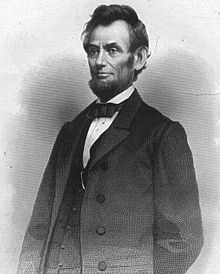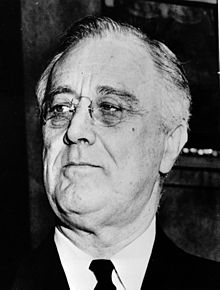Powers of the President of the United States
The powers of the President of the United States consist of those enumerated by the Constitution and those derived from the influence and prestige of the President's office.
Executive force

Within the United States executive branch , the president has extensive powers to oversee national affairs and the work of the federal government. To this end, the President can announce rules, ordinances and decrees known as Executive Orders, which are legally binding on the authorities and officials subordinate to the Executive, but do not require the approval of Congress , but can be withdrawn by it. As the commander in chief of the armed forces , the president also has the option of convening the state national guards for federal purposes. In wartime, Congress often grants additional powers to guarantee the stability of the American economy and the security of the United States. Such actions cannot be read directly from the constitution, but have arisen from constitutional reality.
The President, with the approval of the Senate, appoints the ministers and directors of many of the federal agencies involved in the executive power. In 2003, more than 3,000 official posts were required to be appointed by the President, of which more than 1,200 required the approval of the Senate. From a historical point of view, the so-called “ spoils system ” is important: the election winner systematically rewarded his patrons and supporters with official posts. The " Plum Book ", published regularly since 1960, lists all office holders appointed by the President.
The majority of the posts within the executing federal authorities, however, are filled by a system similar to that of the German civil servants , which takes greater account of qualifications and seniority.
The President is also responsible for submitting a budget to Congress for approval.
Legislative power
Even if the constitution assigns all legislative powers to Congress, the president plays an important role in formulating the law because of his extensive administrative apparatus. The President can also formally veto bills from Congress . If this is not overruled by the MPs with a two-thirds majority , the law has failed. Furthermore, the so-called " pocket veto " is available to the President as an instrument to block the law. If the President receives a legislative proposal in the last ten days before a lengthy break in the session of Congress, he can make it ineffective by not signing it. He can basically put it in his pocket because laws only come into effect when they are signed by the president. However, the president is limited to either adopting or rejecting a law as a whole. A line item veto , which enables individual passages to be deleted, is not intended. A law passed by Congress in 1996 that allowed the president to veto a line item was ruled unconstitutional by the Supreme Court in 1998 . However, almost all have governors of the states the power to line-item veto.
Many of the bills drafted by Congress originate in the executive branch. In annual and special messages to Congress, the President often suggests legislative initiatives that he considers necessary. The most significant of these messages is the annual State of the Union Address , an annual government statement that traditionally takes place in January before the entire Congress. In the declaration, the President describes the state of the nation and the priorities of his government program for the following year. If the Congress does not deal with the President's initiatives, he can constitutionally call the MPs to a special session. Outside of this limited role in the legislative space, the president is concerned with convincing the public of his plans and thereby influencing the legislative process.
Judicial power
One of the constitutional tasks of the President is the appointment of all federal judges with the approval of the Senate. Another important possibility for the President to influence is the pardon , with which he can grant any pardon who is suspected or found guilty by a court of breaking federal laws. The only exception is the formal impeachment by Congress (here Impeachment ). The right to pardon has developed to allow reductions in sentences and shortening of prison sentences.
Foreign policy
The constitution stipulates that the president is primarily responsible for political relationships with other states. With the approval of the Senate, the President appoints all ambassadors and consuls and also receives ambassadors and other representatives of other states. With the help of the Foreign Minister, the President maintains relations with the governments of other countries. Occasionally the President himself takes part in international conferences if his presence is necessary for protocol or political reasons. President Woodrow Wilson led the American delegation to the Peace Conference in Versailles after World War I , President Franklin D. Roosevelt met with other heads of state during World War II, and every President has since held summits with other governments for the purpose of economic or political cooperation or to negotiate bilateral or multilateral agreements.
With the help of the Department of Defense and the Department of State , the President is also responsible for protecting American citizens abroad and foreign citizens domestically. The president decides which states and governments are officially recognized by the United States. Agreements with other states negotiated by it become legally binding with the consent of the Senate. The President can also negotiate executive agreements with other states that do not require the approval of the Senate.
